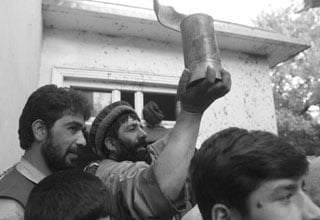Afghanistan, Feb. 2002. Rotting bodies of what were once innocent villagers are randomly strewn about the sandy ground. A fresh carcass belonging to a dead mother, crouching protectively over her scared child before being shot in the back, lies outside the burning remains of a local grocery hut.Reports similar to this one, inspired by The New York Times, are constantly being discovered as the Pentagon faces increasing accusation from journalists, human rights groups, and local Afghans saying that the U.S. Government relied on inaccurate intelligence during the bombings, resulting in a vast number of unnecessary civilian deaths.
When asked of the possibility of relying on bad data, Defense Secretary Donald H. Rumsfeld dismissed all claims as “enemy propaganda.”
Despite Rumsfeld’s apparent confidence in the situation, an all-around investigation of the Pentagon’s actions is occurring in Washington at this very moment, which is rare.
William H. Arkin, a former army intelligence analyst and military advisor to the Human Rights Watch, is one of the main leaders in the investigation.
“We’ve got about 300 incidents in our database, and I’d say about a third involve some civilian casualties that would be worth taking a second look at,” Arkin said.
Finding clues to uncover this mystery, however, has proven to be a challenge, as many of the bodies have rotted away into the sand, leaving little evidence for investigators to go with. A lack of overall ground troops also adds to the difficulty.
Rear Admiral Craig R. Quigley, a senior spokesman for the Central Command, explained the situation.
“What we were challenged with each and every time, particularly in the early weeks of the war, was that we did not have people on the ground to check … you just don’t find much anymore,” Quigley said.
Despite claims from both Rumsfeld and Quigley that the bombing was conducted accurately, countless claims from survivors in Afghanistan have suggested otherwise.
“I didn’t know why they were shooting,” recollected Nayaz Muhammad, 27, a local villager in the Hazar Qadam neighborhood, as he described a raid by American forces during which he was forced to watch his friends and family die around him.
Other Afghans described their stories with angry, shaking rage, wanting to know what they had done to deserve such horror and devastation.
“Tell me why our homes were destroyed and 55 people – even little children – are dead?” a furious young man named Gul Nabi, demanded of reporters.
“There were no [Al Qaeda members] here. There were only farmers who lived a good life, and prayed to Allah for peace,” he said.
When asked about the mass killings, Rumsfeld disagreed with the severity of the claims, saying that everyone makes mistakes.
“From time to time, innocent people, noncombatants, undoubtedly are killed and that is always unfortunate,” Rumsfeld said.
Reports coming in from human rights researchers across the country estimate the number of deaths at anywhere from 1,000 to roughly 4,000 dead innocent civilians.
The question that journalists and activists are now asking is, where did the Pentagon get this faulty information? It has been speculated that the source could have been possibly some random local warlord looking to exploit the Pentagon for his advantage. But at this point, it is simply too early to tell.
Ahmed Wali Karzai, a pro-American Afghan official, reflected the views of Afghans all across the country.
“I hope that the Americans are brave enough to name the person who gave the false information to them, when the time comes,” he said.

